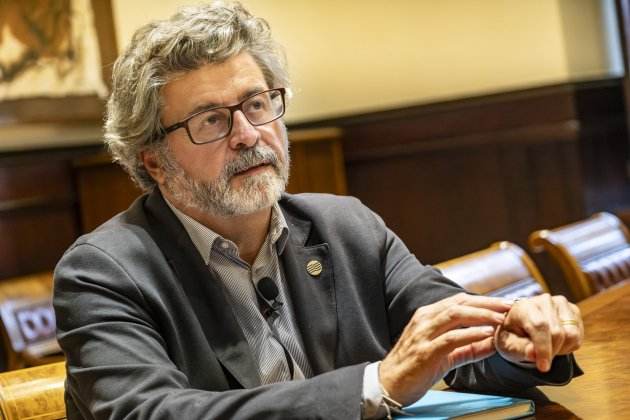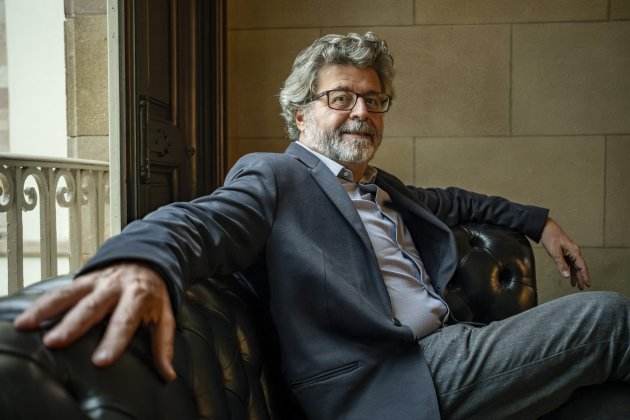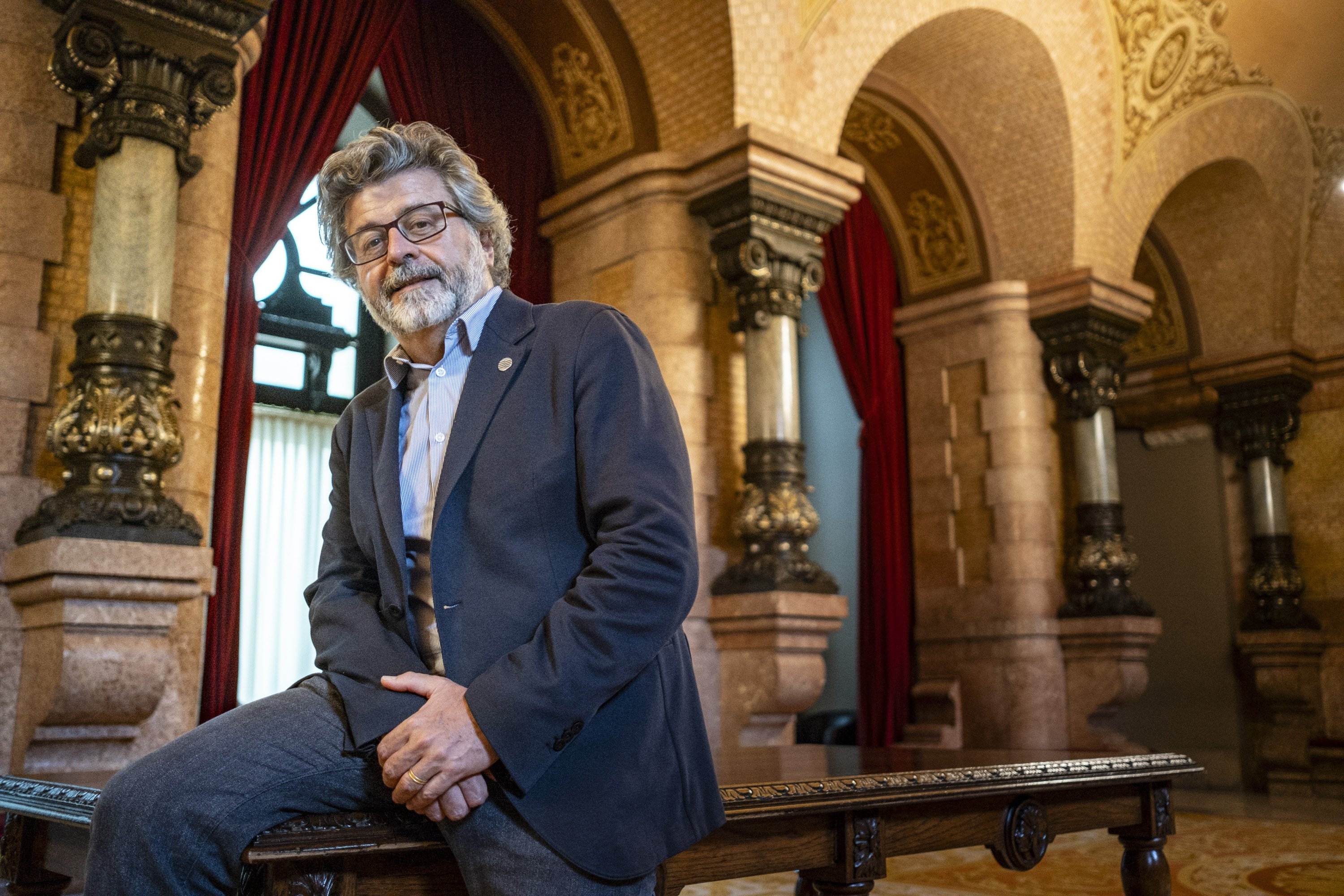Toni Castellà (Barcelona, 1970) is the leader of Demòcrates, the Catalan pro-independence party which allied with Together for Catalonia (Junts) on the ticket for the 2021 elections to the Catalan Parliament. He is also spokesperson for Council of the Republic, the body created to pursue Catalan independence from exile, founded by Carles Puigdemont and based in Waterloo. Thanks to his first role, he became a Catalan MP in June, in replacement of Laura Borràs, disqualified from office by the Catalan High Court. Meanwhile his role in the Council of the Republic puts him in the spotlight at present with regard to the internal changes the body is making. But these same positions give him a particular perspective on the negotiations open between the pro-independence forces and the PSOE for the investiture of Pedro Sánchez, negotiations in which Carles Puigdemont is clearly playing a lead role, although not as leader of the Council of the Republic, but rather as the key figure in Junts. "In politics," he says, "the position is not relevant, but rather the leadership. Puigdemont is the leadership of Junts." ElNacional.cat spoke to Toni Castellà in his office at the Catalan Parliament.
What is the position of the Council of the Republic regarding the negotiations?
Before the elections we said that the only sense of running for election in Madrid is if we use the Spanish institutions to make decisions that lead to progress towards the goal of independence. Any other objective, from the Council, we consider to be pointless. Therefore, we are not telling the parties how to conduct the negotiations. We care about the result. We don't care about the 'how'. What we care about is the 'what', what one gets out of it.
The only sense of running for elections in Madrid is if we use the Spanish institutions to make progress towards independence
And does the amnesty signify making progress in the independence process?
The amnesty in itself is to achieve justice for a whole sector of people that the Spanish state is repressing because of what we did on October 1st [1-O]. We consider that the 1st October referendum is not a crime. Therefore, the amnesty is a step forward, in the sense that the Spanish state apologizes and recognizes that the 1-O is not a crime, but it is not enough. In other words, amnesty situates the debate in political terrain. And it makes the Spanish government correct itself. But the amnesty must be accompanied by the recognition of Catalonia as a political subject. If amnesty is the be-all and end-all, it's not worth it. The amnesty is the minimum initial condition to start negotiating a process of national liberation with the Spanish state.

Now there is a kind of race between the pro-independence parties, to see who is the one who demands the most and who gets the most from Pedro Sánchez. In a conference, Puigdemont pointed out the minimum, the preconditions to start negotiating, but he did not specifically talk about the referendum as an essential condition...
The precondition is, first, to end the deadlock, recognize that the path is not the judicial one and, therefore, ask for forgiveness. I say this because of some things I have heard from the Catalan National Assembly (ANC). Receiving a pardon means they forgive you; an amnesty means that it is the state that asks for forgiveness. Two, we ask for a verifier, because we don't trust one of the parties to comply. And, three, the minimum basis to begin negotiating is that you, the Spanish state, recognize me as a political subject. That is where it all begins. The moment a state recognizes you as a political subject, a nation, it recognizes your sovereignty and, therefore, you have the right to exercise it. And this is where you can start negotiating how to do it. The conflict is that the state does not recognize that Catalonia is a political subject in which sovereignty rests with its citizens.
Receiving a pardon means they forgive you; an amnesty means that it is the state that asks for forgiveness
And so what if there was this recognition, but without any talk of a referendum?
The Spanish Constitution clearly states that the sovereignty of the Spanish state rests with the citizens of the Spanish state. Full stop, nothing more. Opening this issue would amount to a second Transition for the Spanish State. It is accepting that the sovereignty of the Kingdom of Spain does not lie with all Spanish citizens, but there is a part [of the Constitution] in which what was called "nationalities" is recognized as another nation and that [their] sovereignty lies with its citizens. This has obviously not existed, neither in the Constitution nor has anyone ever accepted such an approach. And how is this exercised? The translation is a referendum.
If your corset is the Spanish Constitution, my corset is the result of the 1-O
But in fact, the argument that "this is not what the Constitution says" is the main argument put forward by the PSOE for not accepting it...
But the Constitution can be interpreted as they please. And if not, explain to me how the judicial system has been able to imprison elected officials - the first country to imprison elected officials in democratic Europe - by forcing and reinterpreting something that is not even in its Penal Code. The Penal Code does not say that a referendum is a crime. Well look, it's not our problem, it's their problem. We are not running to preside over Spain. They are. If your corset is the Spanish Constitution, my corset is the result of the 1-O. Reinterpret, if you want to be prime minister and, if not, the alternative is to give Vox and PP a second chance.
Puigdemont left the leadership of Junts to become the president of the Council of the Republic, but now leads the negotiations on behalf of Junts. Does this mean that ERC is right when it considers the Council as an appendix of Junts?
Carles Puigdemont is not another Junts member, he is the Junts leadership. In politics, the position is not important, but rather, the leadership you exercise. Other political leaders of other front-line parties have not given up their position.
If the PSOE is able to make an approach that really shakes even the concept of Spain itself, there will be some option and, if not, I don't see it
From 1 to 10, how do you rate the chances for the investiture to go ahead?
I'd say 50/50. I'm not very optimistic. The big decision in this case will be much more from Pedro Sánchez. If Sánchez takes this negotiation as a very complex negotiation, but as one more of those that might happen in a legislature, it will not come to fruition. If he dares to take the risk that this is a negotiation of equal or greater importance than the Spanish Transition, there may be an opportunity. One thing that the PSOE must understand is that we didn't call a referendum, nor did two million people come out to the streets, get beaten as they protected the ballot boxes with their bodies, nor did people go to prison, nor are there still people in exile, to finally watch as we negotiate a little more or better of an economic deal, a Renfe deal or I don't know what. It doesn't make any sense. If the PSOE is able to make an approach that really shakes even the concept of Spain itself, there will be some option and, if not, I don't see it.
Jordi Pujol warned Puigdemont this week to take care with his candour in the negotiation to prevent the Spanish state from deceiving Catalonia. Do you think there is a risk of being too candid?
I hope not. But what Jordi Pujol says is very important because he was a Catalan statesman. Pujol was able in the Transition to build a Generalitat de Catalunya that ended up consolidating state structures, with all the complications, with post-Francoism, with a PSOE that endorsed the GAL deaths quads, with an aggressive Aznar... Therefore, it is important when he calls to avoid being candid, what he's basically saying is: what you're not going to do is try to do a tiny bit less less than what we've done before. You have to do a little more. You have to push it very hard. This is a conflict of sovereignty and this is a disputed territory. This is geopolitics. Be aware that the opponent is very tough. You are questioning the essence of the national structure of the Spanish state.
The recognition that sovereignty lies with the people of Catalonia is a rupture, it is a different model to that of the Spanish Transition, the Constitution
Which result do you foresee? Amnesty, a recognition of Catalonia as a political entity, that they might avoid talking about a referendum or independence?
I see only two possible outcomes. Either there is an amnesty and a recognition that sovereignty lies with the people of Catalonia. And after that, the ability of each side to develop that. Therefore, this is a rupture, it is a different model to that of the Spanish Transition, the Constitution. And if that doesn't happen, I see an electoral process. I don't see an in-between. And I know it's hard.
One of the consultations the Council of the Republic is holding, at the initiative of a member, is to ask whether the Council should have the policy of blocking the investiture of Pedro Sánchez. In the event that the members vote in favour, how would it determine what Carles Puigdemont will do in the negotiation?
That will be decided by Carles Puigdemont. But I can answer that I am part of a party called Demòcrates and I am also the spokesperson of the Council. If the Council decides this, then it will be a recommendation that the Council makes to Demòcrates and then the grass roots of Demòcrates would decide it, as they are the ones who put us here and voted for us. And we will take that into account, of course, exactly as we take into account the procedures of the ANC, Òmnium or any entity in the country.
For now, Dolors Feliu and the ANC have made clear what they think.
Do you think so? Sometimes it's hard for me to understand exactly what their proposal is.
I am referring to the amnesty, she made it clear that for the ANC, it is not a goal.
Yes, but a week before the event commemorating the 1-O we agreed on a slogan that said amnesty. We brought all the organization together, we proposed a slogan, we discussed. I will not make public the content of the discussions, but the result is clear: we all went out and called an event with the slogan 'Amnesty, independence, self-determination'. It is a bit strange to call the public to march under a slogan and to say at the rally that you are against the very slogan that you defend.
I understand González and Guerra. An amnesty means that Spain apologizes. Spanish nationalists are devastated by this
Feliu's is not the only position against the amnesty. With very different arguments, Socialist leaders such as Felipe González and Alfonso Guerra also railed against it.
I understand them perfectly. They are consistent. An amnesty means that the Spanish state apologizes to the Catalans: I was wrong. And therefore, I back down from any imputation, with legal or criminal consequences. Spanish nationalists are devastated by this, they don't even want to hear about it. What is not very logical is for an independentist to argue this. On the other hand, I do understand that the far right, the Spanish nationalists, the people who led the GAL, outdated Spanish Francoism, are very much against it. It is logical, they are consistent.


